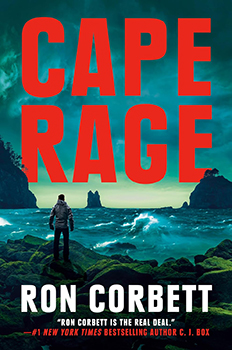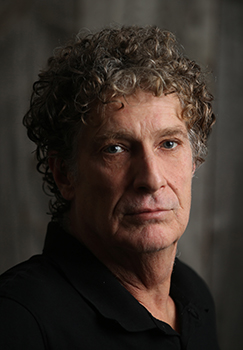

Features Ron Corbett
AN ISOLATED ISLAND, A MURDEROUS FAMILY, THEIR PSYCHO SON-IN-LAW, AND ONE DEDICATED POLICE OFFICER
The Big Thrill Interviews Author Ron Corbett
 The FBI’s wilderness expert, Detroit police officer Danny Barrett, emerges from the Maine woods portrayed in Ron Corbett’s series debut, The Sweet Goodbye, to take on a new challenge: go to Cape Rage in the Pacific Northwest to gather evidence against crime patriarch Ambrose Danby, his son, Finn, and daughter, Tess, for the murder of two guards during a bank robbery. The Danbys hole up on Danby Island near Cape Rage, an isolated and unforgiving place if there ever was one. Danny’s FBI superiors arrange for him to go undercover in the Danby organization on the island.
The FBI’s wilderness expert, Detroit police officer Danny Barrett, emerges from the Maine woods portrayed in Ron Corbett’s series debut, The Sweet Goodbye, to take on a new challenge: go to Cape Rage in the Pacific Northwest to gather evidence against crime patriarch Ambrose Danby, his son, Finn, and daughter, Tess, for the murder of two guards during a bank robbery. The Danbys hole up on Danby Island near Cape Rage, an isolated and unforgiving place if there ever was one. Danny’s FBI superiors arrange for him to go undercover in the Danby organization on the island.
As Danny works to get inside the Danby family’s dealings, an unexpected development complicates his efforts. Tess’s conniving husband, Henry Carter—whom the family had shot and left for dead—did not, in fact, die, and he is coming for revenge.
The plot positively writhes with twists as Danny works to find the loot stolen from the bank and arrest the Danbys before Carter kills them all.
The Big Thrill caught up with Ron Corbett to ask him about this mesmerizing story.
How did you come up with Danny Barrett, and what intrigues you the most about him?
Barrett is a Detroit police officer who works undercover, moving from case to case when different police agencies—often the FBI—request his services. These requests normally come when a case is in trouble, about to be shut down, or about to explode. Barrett is the equivalent of a Hail Mary pass in a football game, the call you make when you have nothing else to lose. There’s a lot that intrigues me about him, about his background, how he ended up with a lone wolf occupation like that. Hoping to explore that more in upcoming books.
What inspired CAPE RAGE?
I wanted to write something with the Pacific Northwest as the setting. I wanted vistas. I wanted the sea. Place is always important in the stories I write, so the setting had a lot to do with what was going to happen in this story.
Danby Island essentially creates a locked room mystery for Danny to solve. What led you to this story structure?
That’s a good catch because there are a couple of stories happening at the same time in CAPE RAGE. I’m not sure everyone would have seen that, but yeah, when you’re on that island, it has the feel of a locked-room mystery. The first novel I wrote, Ragged Lake, was a straight-ahead locked-room mystery. That was part of a series, the Frank Yakabuski mysteries, and the fourth book in that series, Muskie Falls, came out just before Christmas. It was another locked-room mystery. It’s a great structure that keeps the reader guessing.
What research did you do?
I lived on Vancouver Island for a couple years, a long time ago, in a log cabin outside Victoria. It was a great time in my life. The research was mostly memory.
Henry Carter certainly throws a monkey wrench into Danny’s plans. Tell us more about that.
I love Henry Carter. I love villains, which maybe says something troubling about me, but the Henry Carter passages are the ones I absolutely loved writing. The book starts with Carter getting shot in the woods and left for dead, surviving and wondering whether he should go after his wife, and deciding, yeah, he should. That was the first thing I wrote. Carter eventually meets Barrett—that’s what CAPE RAGE is all leading up to.
All of the characters are complex and fully drawn, but Tess and the young girl are especially intriguing. What are their purposes in the story?
That’s another great question, but I can’t fully answer it. I understand Tess, but I don’t fully understand the girl. Tess is Henry Carter’s wife. She was there when he was shot, and she is the enigma, the unanswerable question that goes something like: What is love? Or, if you want to try and answer it, go with what Al Green came up with: “ Love: Make you do good, make you do bad.” Carter loves Tess Danby, but she betrayed him. Or did she? If you love someone, I think they could have a knife to your throat, and you’d still be asking those questions. That’s Tess’s role in the story. As for the girl’s purpose, she’s Carter’s salvation. I just haven’t fully figured out how that worked.
What drew you to becoming a writer, and what was your path to publication?
Treasure Island. I still remember reading that book and thinking, that’s what I’d like to do, write books like this. The path was 30 years of print journalism, most of it as a newspaper columnist. It was a good path.
What led you to choose the wilderness thriller genre?
I’ve always liked mysteries and thrillers and adventure stories. I have little interest in stories that take forever to get going or that exist mostly in a writer’s head. I like creating a sense of place; it doesn’t always have to be wilderness. It has been so far, and that will always be a big part of it—certainly in the Frank Yakabuski series—but Danny Barrett can end up in the city in some stories. I think great stories always have a strong sense of place, so much so that place is one of the characters.
What led you to explore the dark side?
My love of villains takes me down some dark roads, but it’s more than that. To build tension, to build suspense, you need conflict, you need people behaving badly. It seems inevitable you’re not going to have a lot of sunny days. But it’s more than that even. The people that interest me are not celebrities; they’re not rich and famous. When I was a newspaper columnist, an editor teased me once: “Do you ever interview someone who wears a suit?” Well, not if I can help it. People who are struggling, who are doing the best they can, people on the edge—they interest me. They get my attention. Maybe that comes through in the writing.
How hard is it to write two series at the same time?
It’s a blast having two series. I stole the idea from James Lee Burke, who has Dave Robicheaux and the Holland Family series. It’s fun having two different protagonists. Barrett is mysterious and more violent than Yakabuski, who is very much rooted to the land and stays in one place—a tree with roots kind of guy. I don’t have a favorite. Both have a different vibe. When I want to go on a road trip, maybe get into some trouble, I call up Barrett. When I want to come home, I call Frank.
What advice, if any, do you have for aspiring writers?
Write. That’s the advice John D. Macdonald gave in an essay he wrote. I think Stephen King referenced it recently. MacDonald wrote a crazy number of words before he got anything published. There’s no substitute for doing it, then doing it again, then doing it one more time. As for style, you’ll come up with your own. Maybe don’t use exclamation marks as often as the rest of the world is using them these days. That might make you stand out.
CAPE RAGE will keep you reading long into the night. Don’t turn off the lamp!
The Big Thrill Interviews Author Ron Corbett
- Bruce Borgos - August 8, 2024
- The Big Thrill Recommends: SERVED COLD by James L’Etoile - July 26, 2024
- The Big Thrill Recommends: THE PARIS VENDETTA by Shan Serafin - June 27, 2024

